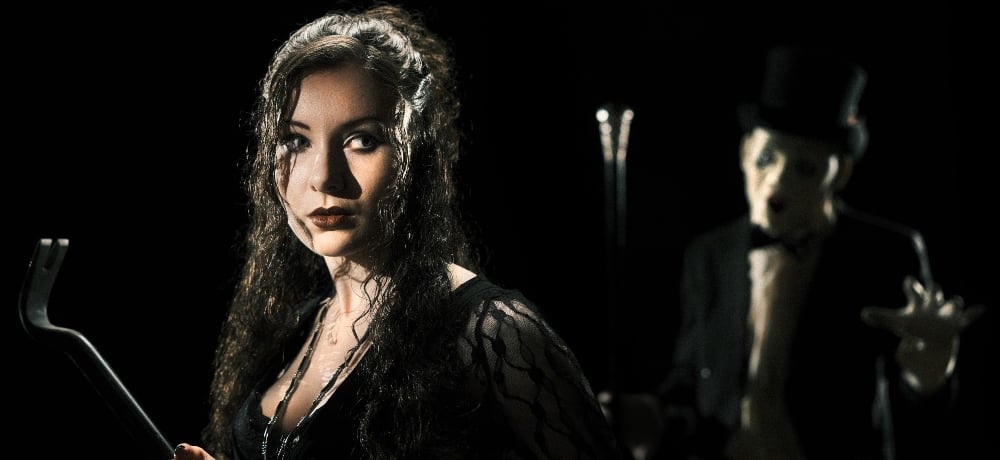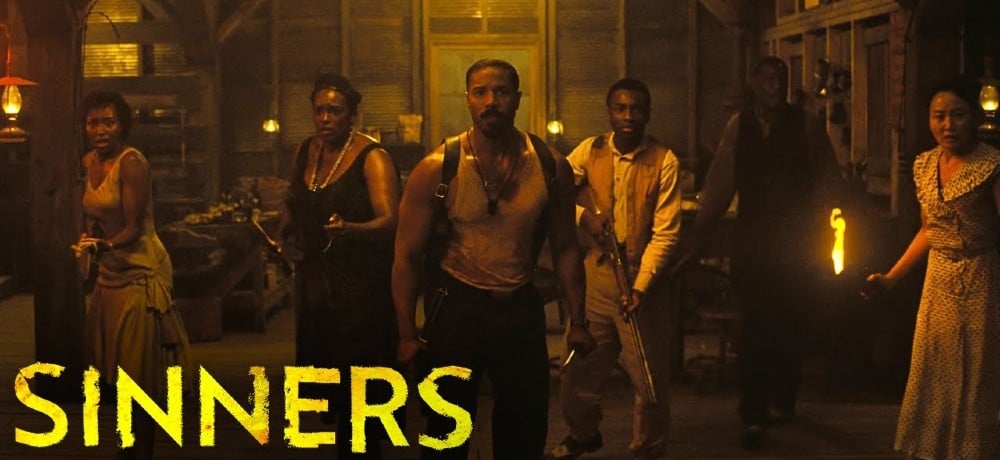






If there was ever a follow-up to 2019's documentary Horror Noire: A History of Black Horror, Sinners would be a centerpiece. Ryan Coogler's Jim Crow-era vampire chiller has the potential to break into mainstream culture like Jordan Peele's Get Out. Its "juke joint" setting earns comparisons to boozy genre films From Dusk Till Dawn and Demon Knight, but there's also a Tarantino-esque historical anger à la Django Unchained or Inglourious Basterds. Coogler's playing in familiar bloodsucking sandboxes, yet has no problem establishing his own unique and volcanic 1930s Black Horror voice.
Michael B. Jordan stars as entrepreneurial twin brothers Smoke and Stack, ex-Chicago gangsters who open an afterhours establishment in their hometown of Clarksdale, Mississippi, circa 1932. Smoke handles business preparations like catfish procurement and supply gathering, while Stack takes their blues prodigy cousin Sammie Moore (Miles Caton) and enlists staffers. Nightfall brings a thirsty, rhythm-hungry crowd to the joint’s grand opening, but it also draws unwanted attention from caucasian neighbors who beg to be invited inside. Smoke denies, Stack hesitates, but before long, their club faces a most unexpected problem: vampires.
Coogler's screenplay lifts bigoted, white-hooded themes at the forefront of Sinners, but soulful cultural introspection becomes its signature. Sammie Moore's invocation of downtrodden, passionate blues sounds parallels beliefs that some music is so potent and transcendent that it shares a divine connection with spiritual realms. Jack O'Connell's ringleader vampire, Remmick, introduces talking points about Irish-American immigrants, equating their treatment to Black and Asian immigrants, only adding more complexity into the fold. Sinners hinges on the Black experience under Southern America's segregation, but its commentary isn't narrow. Vampirism becomes an on-the-nose yet necessary duplication of racism's ability to spread like an infection, but there's much more heft behind brotherly bonding, witchy tropes, and Black freedoms as they pertain to modern declines.
Ludwig Göransson's immaculate score is the glue that binds Sinners. Twangy, porch-rockin' acoustic riffs incorporating rattlesnake hisses and other Southern sounds smash into cathedral bellows like a gothic symphony. The juke joint crowd’s merriment matches tempo with escalating danger noises, while influences from other Black musicians of future eras accompanies blues playing to harp upon music's meaningful relationship in cultural arenas. Then there are the showcase performance numbers, from Miles Caton's literal barnburner of a decade-crossing collaboration to O'Connell's entrancing jig to "The Rocky Road to Dublin." Sinners' audible storytelling is off the charts, stemming from Göransson's old-meets-new reinvention of harmonica duets with weeping organ chords.
The double Jordans are flanked by an all-star supporting cast that elevates Sinners. Jordan's ability to play crack-up Stack (gold teeth separate the brothers) and hard-nosed Smoke gives scene partners two fantastic teammates to bounce off. Miles Caton's debut as a solo-pluckin' blues prodigy is remarkable, while a veteran like Delroy Lindo has a blast playing the piano tickler slash lovable drunkard. Then you've got sultry Wunmi Mosaku as a mystic with a massive presence, Jayme Lawson brings the house down stomping dance floors to tantric beats, and Hailee Steinfeld eats her broken heart when running into Stack after his stint in Chicago with Capone. There's no wasted role: Omar Benson Miller's corn-fed bouncer, Li Jun Li's server and signmaker, and musician Peter Dreimanis' vampiric minstrel all make the most of limited time. If there's one thing Coogler nails, it's connecting us with characters the minute they grace the screen.
That said, if Coogler misinterprets From Dusk Till Dawn influences, it's Sinners' rather lengthy first two acts before moonlit action explodes. Much is made of Smoke and Stack's return to Mississippi, Sammie's relationship to his preacher father, and everyone's inherited traumas—all necessary attributes—yet the beginning two-thirds can drag its feet. It's never unenjoyable, and performances keep us transfixed, but in holding stake-stabbing payoffs until the VERY end, there's an imbalance in pacing (that might not bother some). Seth and Richie get to the Titty Twister "good stuff" quicker (by vampire flick terms), where Sinners dwells on setups that morph from temptations to teases with a slight frustration over two-plus hours.
Intentionality goes a long way for Coogler… most of the time. When playing with aspect ratios, for example, he's able to heighten intensity as the frame expands so you don't miss a single drop of blood. Or there's Jordan's duplication, which plays without any hiccups as the actor brawls with "himself." But there are some blurry tracking shots as cinematographer Autumn Durald Arkapaw uses a flurry approach that cuts between frantic movements, especially during darker, more shadowed lighting. Also, while the club’s geography is easy to navigate, there's a particular fight sequence where never-before-seen characters die without indicating their prior whereabouts. Arkapaw otherwise shoots a gorgeous film between dance choreography and tilted perspectives, establishing unease, even if frantic visuals pose a challenge.
As for the outright horror of Sinners, when Remmick's horde finally sieges the juke joint, violence erupts like a cannon blast. Coogler honors the squishier, blood-geyser gratuitousness of 80s horror, holding nothing back. Death is at a premium; characters die horribly, whether undead or human. Wooden barnyard architecture is stained deep red as fangs and claws tear fleshy chunks with ease in a display of feral brutality, juxtaposing Remmick's messages of hippy-dippy togetherness as he tries to persuade Smoke's surviving crew to join his flock. The film is action-first horror when it wants to be, and while patience is required, Coogler pays off multiple plot threads in a barrage of bullets, gushing wounds, and glorious, well-deserved retribution.
Sinners is a full goddamn meal dripping with genre flavors. It's a thoughtful 1930s period piece that holds the energy of a contemporary midnighter hinged on vicious creature thrills (the anti Antebellum). Coogler's ability to translate cyclical societal oppression into a From Dusk Till Dawn riff stands well on its own is pumped full of pulp, poise, and passion. A knockout ensemble jumps, jives, and dies to a soundtrack of generational woes in Sinners, but Coogler still finds catharsis through aggressive carnage. "Leave politics out of horror" bros sure will be mad—which only means we've got an effective banger on our hands.
Movie Score: 3.5/5